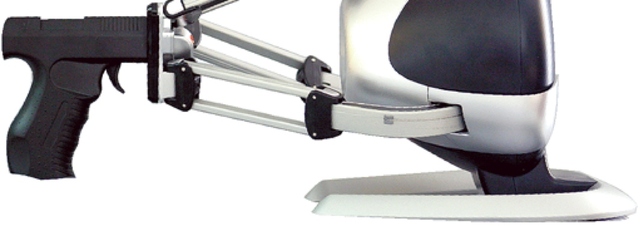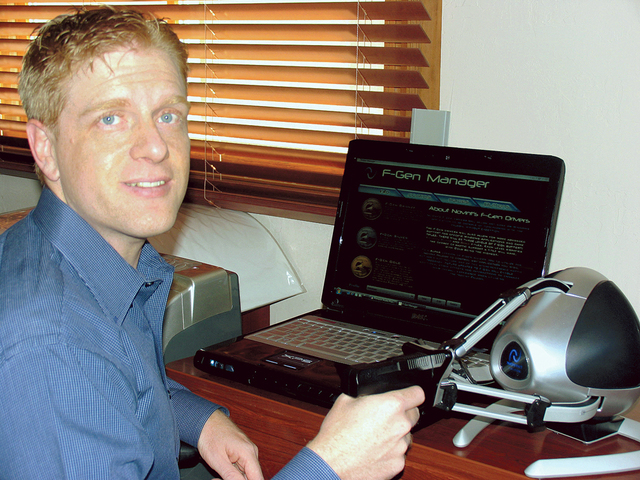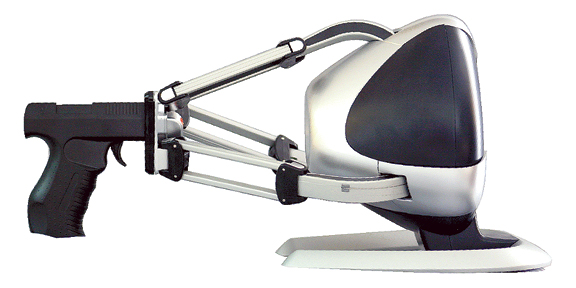Haptic technology is to our sense of touch what graphics are to our sense of sight, explains Tom Anderson, CEO of Albuquerque company Novint. “Our technology gives you a sense of touch in computing,” he says. “You hold onto the handle of our device, and you can move it right and left and forward and backward like a mouse, but you can also move it up and down.” It controls a cursor on the screen, Anderson describes, and when that touches something, motors in the device turn on. It gives the operator the sense that they’re touching virtual objects. Anderson’s 15 years of work in the field have culminated in a product called the Falcon, a haptic controller available to consumers for around $180. Price has long been the sticking point for making a haptic device ready for home use. It’s a common technology story: When Anderson began working in haptics at Sandia Labs in 1995, the hardware cost tens of thousands of dollars. He started his own company in 2000, but it wasn’t until a couple of years ago that Novint figured out how to manufacture its Falcon and sell it for less than $200. The vision of Novint, he says, was "to create a technology that would become ubiquitous with computing." Over the course of its evolution, Novint’s technology has been used by Chrysler for virtual automotive design, in the medical field and as a way to understand scientific data sets. But for the past few years, the company has been moving into games. The Falcon controller launched in 2007, but there weren’t many games it would work with. "You need content to drive your sales," Anderson says. Novint worked on cornering triple-A game titles for a few years. These days, it works with about 50 games, including The Orange Box releases.The Alibi spoke with Anderson about his company, the technology and the future of video-game-making in Albuquerque. What pushed you to leave Sandia Labs and start your own company? The haptic technology is so compelling. The first time I tried it, I just fell in love. I’ve given thousands of demos, and I think no one’s really understood until they’ve tried it. It’s really outside of our usual experience. I think back to the ’20s when people saw movies for the first time. It’s something most people don’t even really envision can exist. When you touch something and you can actually feel it and it’s physical even though it’s virtual … How lifelike is the device? We developed a dental simulator with the Harvard school of medicine, and in that application, a dentist could drill through a virtual tooth. He would hold onto the handle of our device, and as he moved it around, it moved a virtual drill. As he touched the tooth, the motors would turn on, you’d feel it. It really felt like you were touching a real tooth. When you start drilling through it, you felt like you were really drilling with a real drill. The dean of the Harvard School of Dental Medicine gave us an A+ on the drilling. He says if feels exactly like real life. When did you decide to try making something people could afford and use at home? In 2004, the hardware still cost $15,000. Up until that point, we had only done software. We realized to fulfill the vision of the company, we needed to take our destiny into our own hands and get into the hardware side of the business. At the time, everyone said we were crazy: You’re never going to be able to create a device that’s at a consumer price point and does what these high-end devices do. To make a long story short, we did it. What brought the price down? We searched around the world, literally. The haptics community is still fairly small. We found other companies that had haptic devices, and we visited them. There was a Swiss company that had a device we thought could be turned into a consumer-level device. It cost $15,000, but it had a design that looked like it could be consumerized. We took that design and worked with an industrial design firm. We redesigned it, shrunk it down, made all the parts mass manufacturable. We went one one-hundredth of the cost, but we maintained a device that’s still high enough fidelity to simulate a medical procedure. Tell me about the video game industry in the state. One thing I’m optimistic about is it seems there’s been a push for the film industry here. There’s a lot of overlap between that and the game industry. So running a gaming company here in town, I’m hopeful that some of that enthusiasm will carry over. If this technology really takes off, it’s a technology that could fundamentally change the entire industry. That’s not just me saying that. We’ve had a lot of press and reviews that have said this is the future of gaming as a whole. So hopefully Novint will lead a lot of growth in the gaming industry in New Mexico. Do you have enough game titles under your belt to make the kind of sales you need? The most exciting thing on the game side—and it’s a game-changer for us—we also just developed a product called F-Gen. It lets the Falcon work with any game. You can open any game, take it out of the box and use the Falcon to control the game. Why do you think gamers will want to use this? The biggest place people have been using it right now is shooters. We also have add-ons you can attach to the hardware called grips or handles. When you’re playing a shooter game, you’re holding onto the pistol grips, you’re actually holding onto a real physical gun handle. When you pull the trigger, you feel recoil. And if somebody shoots you from the side or something explodes next to you, you feel that explosion and whatever direction it came from. It really makes you feel like you’re in the game. The Falcon also works really well for every genre. We’ll be doing racing games, sports games, real-time strategy games, really any type of game you can think of. How widely do you think this will be used? It’s one of our most basic human senses, our sense of touch. The vision when we started Novint, and the vision still, is that this is one of the few technologies that we’ll see in our lifetime that fundamentally changes computing. We’re the leaders in the field right now, but whether it’s us or someone else … .It’s a technology that could be on every computer in the future. I don’t have any doubt of that.
The Falcon is available at Sandia Computers (3625 Wyoming NE), Computer Corner (4410 Menaul NE) and Yusif's Cafe (216 Yale SE).







